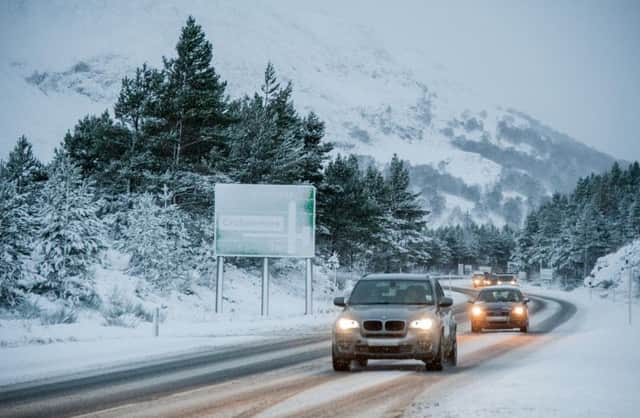Weather: Snowstorms cause chaos across Scotland


The Met Office issued a yellow “be aware” warning yesterday for most of Scotland as gales gradually eased and were replaced by wintry showers .
The Highlands experienced heavy snowfall and snow gates were closed on the A93 between Braemar and Glenshee and also on the A939 between Tomintoul and Cock Bridge.
Advertisement
Hide AdAdvertisement
Hide AdForecasters warned there could be “significant” snowfall across parts of Scotland today and into the weekend.
The Forth Road Bridge was closed in both directions for around an hour yesterday, and traffic diverted until approximately 2:30pm after reports of ice falling from the top of the structure after snow and ice accumulated on towers and cables above the carriageway. A number of drivers reported hearing thuds as they passed the bridge’s south tower.
CalMac cancelled a number of ferry services including between Oban and Craignure, Barra and Eriskay and Malaig to Armadale.
Meanwhile, drivers reported wet and icy conditions on the M8 and M74 and there were several minor road accidents on the A9, which caused ten-mile delays of up to two hours.
Jerry Stewart, director of courier firm Eagle Couriers – whose own 15-mile morning commute from Airdrie to Bathgate yesterday took 65 minutes – said new Scottish transport minister Derek Mackay needed to act quickly to avoid another “snowmaggedon” similar to that seen in the winter of 2010-11.
He said: “This is the first snowfall of the winter and it was far from heavy, so this really does not bode well for motorists and other road users.
CONNECT WITH THE SCOTSMAN
• Subscribe to our daily newsletter (requires registration) and get the latest news, sport and business headlines delivered to your inbox every morning
“I don’t know if the authorities failed to get gritters out on time or whatever. The bottom line is that this weather was hardly unexpected, hardly extreme and hardly a cause for effectively shutting down our main motorway.”
Advertisement
Hide AdAdvertisement
Hide AdTransport Scotland defended its actions, saying its operating companies had 162 gritters in action across the country overnight into Thursday. He said the M8 between Livingston and Newhouse received two full precautionary salt treatments, in addition to continuous winter patrols by fully loaded gritters.
Stewart Leggett from Transport Scotland, said: “Our operating companies have 24-hour dedicated winter maintenance services operating across all Scotland’s trunk roads. This response will continue across the season and people can find out where the patrols are out in their areas on the Traffic Scotland website.”
Looking ahead, a Met Office spokesman said the cold and unsettled weather would continue through to the weekend.
A spokesman said: “A band of rain and hill snow in the north are expected. There is also a risk of some snow down to lower levels at times in eastern and north-eastern parts. Rain and snow will clear early on Friday, leaving bright but cold conditions. Brisk winds will exacerbate the cold feel at times and a few wintry showers will follow.”
The “weather bomb” is a colloquialism for the meteorological term rapid cyclogenesis, meaning a deep low-pressure system – which in this instance has been moving slowly eastwards between Iceland and Scotland.
A lightning strike just after 9am yesterday near Fort Augustus left 27,000 homes in the Western Isles and Skye – the area worst affected by the stormy conditions along the west coast of Scotland – without power, after 3,000 homes had been left without it on Wednesday.
Hundreds of engineers had worked to restore supplies across the Western Isles, Shetland, Orkney and rural areas, only for the lightning – which power company SSE said had been the biggest feature of the “weather bomb” to cause additional disruption. By last night all of the affected homes had their supply restored.
Scotland’s Deputy First Minister John Swinney said: “Obviously there has been transport disruption, principally on the ferry network and also on some of the coastal rail services, where it’s just been unsafe to run trains because of the dangers of the coastal flooding that could have taken place.
Advertisement
Hide AdAdvertisement
Hide Ad“Some alerts remain in place, and we are not out of the woods yet, but any necessary repairs and safety checks on the transport network are expected to go ahead as planned.”
Elsewhere, planned works on the A90 Brechin bypass were postponed due to the weather. The £280,000 project was to start next week but has been rearranged for the new year.
British Red Cross emergency response teams were deployed yesterday morning after lightning strikes knocked out power supplies to parts of South Ayrshire, while Border Search and Rescue were called out after dozens of cars were stranded in heavy snowfall.
Waves of up to 40ft (12m) battered the west coast for much of Wednesday, with the Centre for Environment, Fisheries and Aquaculture Science yesterday revealing that one of its monitoring buoys had recorded a wave of 52½ft at 3pm – the highest it had ever seen.
SCOTSMAN TABLET AND IPHONE APPS